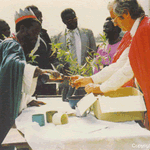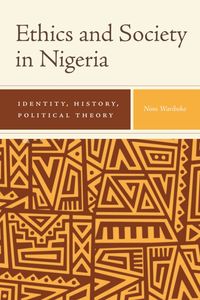African Initiatives

Boston University hosts the second oldest African Studies Center in the United States, and is recognized by the federal government for its excellence in the study of African languages and cultures. The School of Theology is a vital component of African Studies at Boston University, beginning with the sending of graduates to Africa as missionaries over a century ago. Important African alumni include Bishop Josiah Kibira (1964 graduate), the first African head of the Lutheran World Federation; Dr. Kenaleone Ketshabile, Head of the Mission Desk, Methodist Church of Southern Africa; Yusufu Turaki, Professor and former General Secretary of the Evangelical Church of West Africa; and Professor Emmanuel Anyambod, Rector of the Protestant University of Central Africa.

Africa research in the CGCM grows from the work of retired Professor M.L. “Inus” Daneel. His over forty-year presence among African Initiated Churches in Zimbabwe culminated in the 1990s with the largest tree-planting movement in southern Africa, and a program in Theological Education by Extension. The son of missionary parents, Daneel served as a missionary of the Dutch Mission Councils, and then as professor of African theology and missiology at the University of South Africa. He and Professor Robert co-edit the African Initiatives in Christian Mission Series, published by the University of South Africa Press. The goal of the series is to reflect upon contemporary African Christianity, and to document its expansion. Other Africa projects include the digitization of Daneel’s photography and publications on the multimedia site Old & New In Shona Religion, and ongoing research into southern African traditions of earth-care.
See also the Dictionary of African Christian Biography (DACB) listed under Digital Projects.
Dr. Marthinus Daneel, Africa Research Director
New Book: A History of West Central Africa to 1850
 In his latest book, John Thorton has done substantial new research in primary sources and archives, to create an accessible interpretative history of West Central Africa from earliest times to 1852. He gives comprehensive and in-depth coverage of the region with equal focus given to both internal histories or inter-state interactions and external dynamics and relationships. This study represents an original approach to regional histories which goes beyond the existing scholarship on the area. By contextualising and expanding its range to include treatment of the Portuguese colony of Angola, John K. Thornton provides new understandings of significant events, people, and inter-regional interactions which aid the grounding of the history of West Central Africa within a broader context. A valuable resource to students and scholars of African history.
In his latest book, John Thorton has done substantial new research in primary sources and archives, to create an accessible interpretative history of West Central Africa from earliest times to 1852. He gives comprehensive and in-depth coverage of the region with equal focus given to both internal histories or inter-state interactions and external dynamics and relationships. This study represents an original approach to regional histories which goes beyond the existing scholarship on the area. By contextualising and expanding its range to include treatment of the Portuguese colony of Angola, John K. Thornton provides new understandings of significant events, people, and inter-regional interactions which aid the grounding of the history of West Central Africa within a broader context. A valuable resource to students and scholars of African history.
Call for Submissions: Religious Conversion in Africa
Special Issue Information
Dear Colleagues,
This is a call for essays for a special issue of the peer-reviewed international journal Religions on the topic of religious conversion in Africa. Over the past decade, scholarly attention has focused on the “explosive” expansion of Pentecostalism across the African continent and its narrative of discontinuity with the pre-Pentecostal lives of Pentecostal adherents. This sophisticated research has demonstrated how the emic prioritization of rupture within the Pentecostal discourse of conversion was predicated on a desire to overcome the dysfunction and insecurity of life in neoliberal Africa.
The predominance of Pentecostal Christian practices and discourses within this literature has shaped recent investigations into conversion in three ways:
First, it has marginalized concurrent processes of religious change in Africa that do not necessarily conform to a discourse of rupture. These include, for example, the expansion of East Asian religions (e.g., Hinduism), the growth of new expressions of Christianity (e.g., Russian Orthodox Old Believers and Jehovah’s Witnesses), or the movement from one Christian denomination or tradition to another.
Second, the prioritization of rupture has meant that discussions about the role of cultural endurance and continuity in religious change have fallen largely out of fashion. There are material and psychological realities, however, such as abiding social relations with half-siblings from a polygamous marriage or the language(s) one speaks, that cannot be wished into oblivion following conversion.
Third, even as recent literature on conversion in Africa has reinvigorated scholarly inquiries into the phenomenon of conversion and religious change, it often reproduces older theories’ assumptions about the direction of religious conversion, from “traditional religions” to “world religions”. As a result, developments such as the reemergence of African indigenous religions through the advent of spiritual tourism and their spread throughout diasporic communities (e.g., Vodún in Benin, and Orisa in the Americas) are undertheorized with respect to conversion.
In light of these observations, we invite essays from any historical era, methodological approach, and theoretical framework that seek to make original contributions with respect to conversion and religious change in Africa. We especially welcome essays that interrogate issues of method with respect to source material, offer critical assessments of theories of conversion with respect to religious change in Africa, and are based in contexts beyond Christianity and/or Pentecostalism.
Authors who are interested in submitting an essay to this special issue should send a 250-word abstract of his/her/their paper to the guest editors at Jason.Bruner.1@asu.edu and dhurlbut@bu.edu by 1 September 2019. Notification of accepted proposals will occur by 1 October 2019. Final manuscripts will be due on 1 April 2020. All essays will be peer reviewed.
If you have any questions, please feel free to email the guest editors.
Sincerely,
Dr. Jason Bruner
Mr. David Dmitri Hurlbut
Guest Editors
Manuscript Submission Information
Manuscripts should be submitted online at www.mdpi.com by registering and logging in to this website. Once you are registered, click here to go to the submission form. Manuscripts can be submitted until the deadline. All papers will be peer-reviewed. Accepted papers will be published continuously in the journal (as soon as accepted) and will be listed together on the special issue website. Research articles, review articles as well as short communications are invited. For planned papers, a title and short abstract (about 100 words) can be sent to the Editorial Office for announcement on this website.
Submitted manuscripts should not have been published previously, nor be under consideration for publication elsewhere (except conference proceedings papers). All manuscripts are thoroughly refereed through a double-blind peer-review process. A guide for authors and other relevant information for submission of manuscripts is available on the Instructions for Authors page. Religions is an international peer-reviewed open access monthly journal published by MDPI.
Please visit the Instructions for Authors page before submitting a manuscript. The Article Processing Charges(APCs) of 1000 CHF (Swiss Francs) per published paper are partially funded by institutions through Knowledge Unlatched for a limited number of papers per year. Please contact the editorial office before submission to check whether KU waivers, or discounts are still available. Submitted papers should be well formatted and use good English. Authors may use MDPI's English editing service prior to publication or during author revisions.
Keywords
- Religious Conversion
- Religion
- Ethnography
- Anthropology of Religion
- History of Religion
- New Religious Movements
- African Traditional Religions
- African Christianity
- Islam
- Africa
Yale-Edinburgh 2019
 This year, the Yale Edinburgh Group lamented the loss of one of its co-founders, Lamin Sanneh. Several sessions were built into the program to commemorate his insights and contributions to the field, and there was a special memorial held as well. In his absence, Dana Robert opened the meeting with a lecture on where the Yale-Edinburgh group fits in history, and she also concluded the meeting with reflections on themes she heard over the three days. During breaks, she spent time with such friends as Linda Ochola and Wanjiru Gitau.
This year, the Yale Edinburgh Group lamented the loss of one of its co-founders, Lamin Sanneh. Several sessions were built into the program to commemorate his insights and contributions to the field, and there was a special memorial held as well. In his absence, Dana Robert opened the meeting with a lecture on where the Yale-Edinburgh group fits in history, and she also concluded the meeting with reflections on themes she heard over the three days. During breaks, she spent time with such friends as Linda Ochola and Wanjiru Gitau.
New Book
 Nimi Wariboko, the Walter G. Muelder Professor of Social Ethics, has recently published a new volume: Ethics and Society in Nigeria: Identity, History, Political Theory. This pathbreaking book constructs a socio-ethical identity of Nigeria that can advance its political development. Its method is based on the rediscovery of the practices and principles of emancipatory politics and a retrieval of fundamental virtues and capabilities that go to the core of the functioning of pluralistic communities. Ethics and Society in Nigeria: Identity, History, Political Theory critically engages history, myth, political philosophy, and religion to demonstrate that Nigeria has an unfolding historic identity that can serve as a resource for sustaining increasing levels of human flourishing and democratic republicanism.
Nimi Wariboko, the Walter G. Muelder Professor of Social Ethics, has recently published a new volume: Ethics and Society in Nigeria: Identity, History, Political Theory. This pathbreaking book constructs a socio-ethical identity of Nigeria that can advance its political development. Its method is based on the rediscovery of the practices and principles of emancipatory politics and a retrieval of fundamental virtues and capabilities that go to the core of the functioning of pluralistic communities. Ethics and Society in Nigeria: Identity, History, Political Theory critically engages history, myth, political philosophy, and religion to demonstrate that Nigeria has an unfolding historic identity that can serve as a resource for sustaining increasing levels of human flourishing and democratic republicanism.
Located at the intersection of history and political theory, this work identifies the nature of Nigeria's moral problem, forges the political-theoretic discursive framework for a robust analysis of the problem, and shows a pathway out of the nation's predicament. This three-pronged approach is founded on the retrieval of moral exemplars from the past and critical engagement with history as a social practice, philosophical concept, discipline of study, form of social imaginary, and witness of the flows of contemporary events. Using this methodology, author Nimi Wariboko analyzes various forms of political, religious, and revolutionary identities that have been put forth by different groups in the country and then examines their usefulness for the transformation of Nigeria's problematic socio-ethical identity.
In Praise of Greatness: Nimi Wariboko and Africa’s Leading Public Intellectuals
 Nimi Wariboko is featured in a new book on Africa’s leading public intellectuals and living legends. The book, In Praise of Greatness, by the famous historian Professor Toyin Falola of the University of Texas chronicles the life and scholarship of Africans who have made substantive contributions to knowledge. Wariboko is cited as one of Africa's intellectual pioneers.
Nimi Wariboko is featured in a new book on Africa’s leading public intellectuals and living legends. The book, In Praise of Greatness, by the famous historian Professor Toyin Falola of the University of Texas chronicles the life and scholarship of Africans who have made substantive contributions to knowledge. Wariboko is cited as one of Africa's intellectual pioneers.
The back cover explains: In Praise of Greatness, employing poems and prose, pays homage to those African scholars, artists, and public intellectuals who have been exemplary in developing significant ideas and institutional legacies with far-reaching political, social, and cultural impact. Here are remarkable lives of dedicated service that have transformed society, extended the frontiers of knowledge, preserved values, and offered unique perspectives that replace universalism with pluriversalism. In twenty-two chapters that deploy dynamic poetics, distinct cultural tools, and rich traditions, the book presents multiple global-local biographies of preeminent scholars, living legends, and intellectual giants of Africa and its diaspora. Through individual stories, cumulative analyses demonstrate the existence and elaboration of an ontological and epistemic infrastructure that embodies the powerful paradigms that are essential to attaining progress, promoting ethical scholarship, and presenting distinguished Africans to the outside world. The book argues for the maintenance of strong academic traditions and new social thinking beyond patriarchy, as well as more serious attention to poetic and artistic creativity in surviving, navigating, and transforming the varying forces of modernity and globalization with meticulous and sustained attention to local needs and contexts. In Praise of Greatness advances the agenda of nation building by showcasing the formidable works and enduring genius of prominent individuals who have discovered pathways to optimal outcomes for themselves and others through myriad heroic efforts and honorable relationships of generosity and trust. In Praise of Greatness seeks to inspire intellectual productivity in an emergent generation of scholars; to provide a unique lens for interpreting the past and present; and to promote a collective narrative around African development.
Nimi Wariboko is the Walter G. Muelder Professor of Social Ethics at the Boston University School of Theology and a Faculty Associate of the Center for Global Christianity and Mission.